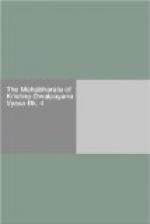[21] This is a very difficult sloka. I am not sure that I have understood it alright. Both Nilakantha and Arjuna Misra are silent. Instead of depending, however, on my own intelligence, I have consulted several friends who have read the Mahabharata thoroughly. The grammatical structure is easy. The only difficulty consists in the second half of the sloka. The meaning, however, I have given is consistent with the tenor of Bhishma’s advice.
[22] Indicating the unobstructed completion of the sacrifice.
SECTION XXIX
Vaisampayana said, “Then Saradwata’s son, Kripa said, ’What the aged Bhishma hath said concerning the Pandavas is reasonable, suited to the occasion, consistent with virtue and profit, agreeable to the ear, fraught with sound reason, and worthy of him. Listen also to what I would say on this subject. It behoveth thee to ascertain the track they have followed and their abode also by means of spies,[23] and to adopt that policy which may bring about thy welfare. O child, he that is solicitous of his welfare should not disregard even an ordinary foe. What shall I say, then, O child, of the Pandavas who are thorough masters of all weapons in battle. When, therefore, the time cometh for the reappearance of the high-souled Pandavas, who, having entered the forest,[24] are now passing their days in close disguise, thou shouldst ascertain thy strength both in thy own kingdom and in those of other kings. Without doubt, the return of the Pandavas is at hand. When their promised term of exile is over, the illustrious and mighty sons of Pritha, endued with immeasurable prowess, will come hither bursting with energy. Do thou, therefore, in order to conclude an advantageous treaty with them, have recourse to sound policy and address thyself to increase thy forces and improve thy treasury. O child, ascertaining all these, reckon thou thy own strength in respect of all thy allies weak and strong.[25] Ascertaining the efficiency, and weakness, and indifference of thy forces, as also who amongst them are well-affected and who are disaffected, we should either fight the foe or make treaty with him. Having recourse to the arts of conciliation, disunion, chastisement, bribery, presents and fair behaviour, attack thy foes and subdue the weak by might, and win over thy allies and troops and by soft speeches. When thou hast (by these means) strengthened thy army and filled thy treasury, entire success will be thine. When thou hast done all this, thou wilt be able to fight with powerful enemies that may present themselves, let alone the sons of Pandu deficient in troops and animals of their own. By adopting all these expedients according to the customs of thy order, thou wilt, O foremost of men, attain enduring happiness in due time!’”
[23] The word tirtha
here means, as Nilakantha rightly
explains spies and not holy
spots.




